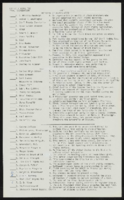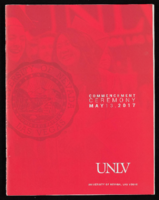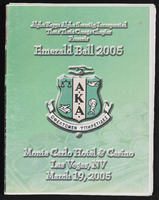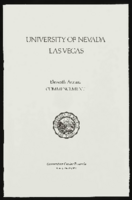Search the Special Collections and Archives Portal
Search Results

UNLV Ethnic Studies 102 final exam (blank) and Ethnic Studies (ETS 480X) "Seminar in Race Awareness: Minority Groups and Media" assigned readings
Date
Archival Collection
Description
From the Roosevelt Fitzgerald Professional Papers (MS-01082) -- Personal and professional papers file.
Text
Janet Quintero (United Way) oral history interview conducted by Kelliann Beavers and Elia Del Carmen Solano-Patricio: transcript
Date
Archival Collection
Description
From the Lincy Institute "Perspectives from the COVID-19 Pandemic" Oral History Project (MS-01178) -- Community organization interviews file.
Text

University of Nevada, Las Vegas (UNLV) Spring 2017 commencement program
Date
Archival Collection
Description
Commencement program from University of Nevada, Las Vegas Commencement Programs and Graduation Lists (UA-00115).
Text

Transcript of interview with Bruce Layne by Claytee D. White, June 18, 2004
Date
Archival Collection
Description
Bruce Layne came to Las Vegas in March of 1955 when he was 10 years of age. He attended High school at Bishop Gorman and college at the University of Nevada Las Vegas where he received a B.S. in Economics. In college, he played baseball for three years and was named All Conference Player in 1966. Growing up in Las Vegas, two of his closest long time friends are Governor Bob Miller and Tito Tiberti. Bruce later went on to become the President of Layne & Associates Insurance which was the largest Insurance Agency in Nevada. Bruce tells fabulous stories of his 40-year experience in the Las Vegas community. When he first arrived there were only about 25,000 people living here. Since then, Bruce has been witness to the enormous growth the city has undergone. Throughout the interview, he discusses his book, My Gift, which he wrote after he discovered he had Parkinson's disease in 1999. The book contains valuable advice on life and it has touched the lives of many people who have read it. Today Bruce Layne is relentlessly fighting his battle with Parkinson's disease both for himself and for thousands of others. He continues to have a positive attitude and is supported by his wife, Sherry Layne, and his two sons, Chad and Trevor. VI
Text

Kochy Tang oral history interview: transcript
Date
Archival Collection
Description
Oral history interview with Kochy Tang conducted by Kristel Peralta, Vanessa Concepcion, and Stefani Evans on May 26, 2021 for Reflections: The Las Vegas Asian American and Pacific Islander Oral History Project. Kochy gives a family history of her parents and how they both came to practice medicine; her father served in a Mobile Army Surgical Hospital during the Korean War and later practiced alternative medicine alongside Kochy's mother in San Francisco and Reno. Kochy shares her educational and employment path pursuing osteopathic medicine and how, with the help of Tony Marnell, she was able to open her pratice within the M Resort and Casino. She discusses her work as a Doctor of Osteopathy (D.O.) and the relationships she has built within the Las Vegas medical community.
Text

Emerald Ball (Monte Carlo Hotel)
Date
Archival Collection
Description
From the Alpha Kappa Alpha Sorority, Incorporated, Theta Theta Omega Chapter Records (MS-01014) -- Ivy Leaf magazines and event souvenir programs file.
Text

Kevin Chung oral history interview: transcript
Date
Archival Collection
Description
Oral history interview with Kevin Chung conducted by Cecelia Winchell, Stefani Evans, and Jerwin Tiu on December 18, 2021 for Reflections: The Las Vegas Asian American and Pacific Islander Oral History Project. Kevin Chung discusses his upbringing in Southern Vietnam and how he and his family were forced to leave the country during the Vietnam War. Chung talks about his family's migration to Minnesota and how they adapted to American culture. He shares his educational background, his professional pursuits as a teacher, and the reasons he and his wife decided to move to Las Vegas. Chung reflects on the importance of STEAM (Science, Technology, Engineering, Art, and Math) in education with an emphasis on the arts and shares his teaching philosophy. He also gives details of his family's lives and talks about the importance of bringing together his Vietnamese and American cultures to connect the different generations of his family.
Text

Diane Meireis oral history interview: transcript
Date
Archival Collection
Description
Oral history interview with Diane Meireis conducted by Claytee D. White on November 06, 2017 for the Remembering 1 October Oral History Project. In this interview, Meireis discusses her experience at the 1 October shooting. She remembers hearing gunfire, the confusion in the crowd, and finding a safe place to hide. Meireis describes the collaboration of strangers, and feeling guilt for not being able to help others as she escaped the venue. Lastly, Meireis discusses her opinions of firearms.
Text

Anthony Kappenman oral history interview: transcript
Date
Archival Collection
Description
Oral history interview with Anthony Kappenman conducted by Claytee D. White on May 16, 2019 for the Remembering 1 October Oral History Project. Kappenman begins the interview by talking about his early life, childhood, work, and his time in the military. Afterwards, he recalls what he did on October 1, 2017 prior to the Route 91 festival and during the shooting. He describes his journey trying to escape the area, arriving at the airport injured, and his stay in the hospital. Then, Kappenman talks about how he felt about the way the city and first responders had responded during the shooting, and how the community united afterwards. Lastly, he talks about his opinions on gun control, his recovery, and how he felt after the shooting.
Text

University of Nevada, Las Vegas (UNLV) 11th commencement program
Date
Archival Collection
Description
Commencement program from University of Nevada, Las Vegas Commencement Programs and Graduation Lists (UA-00115).
Text
